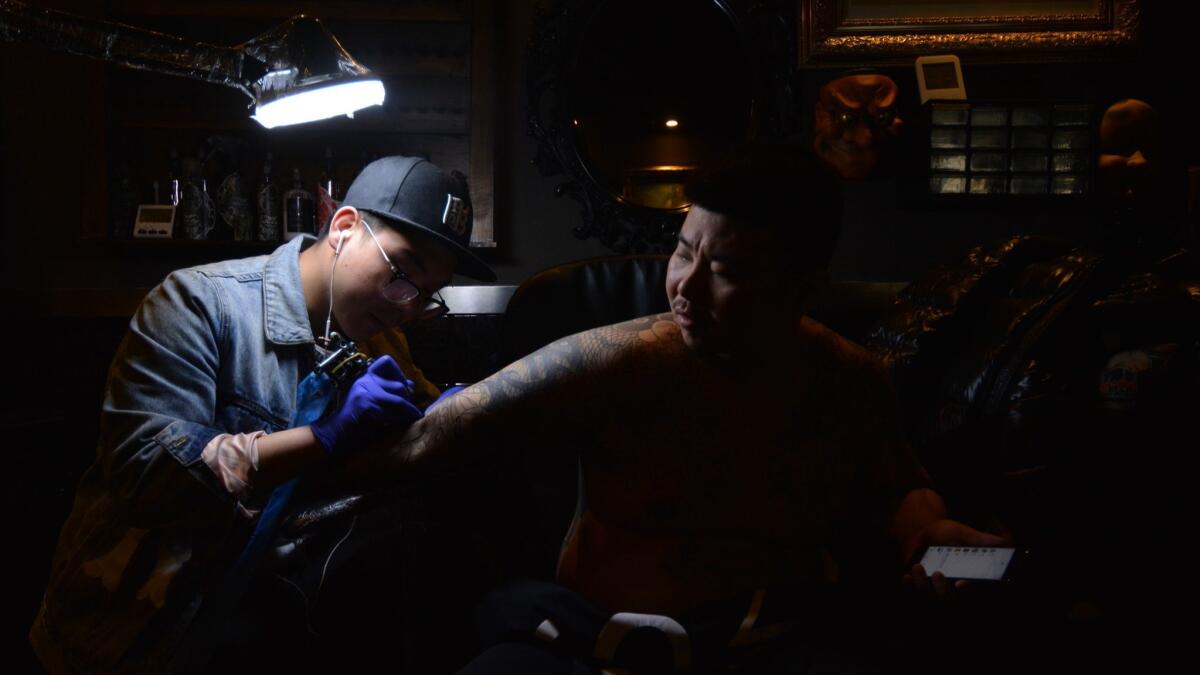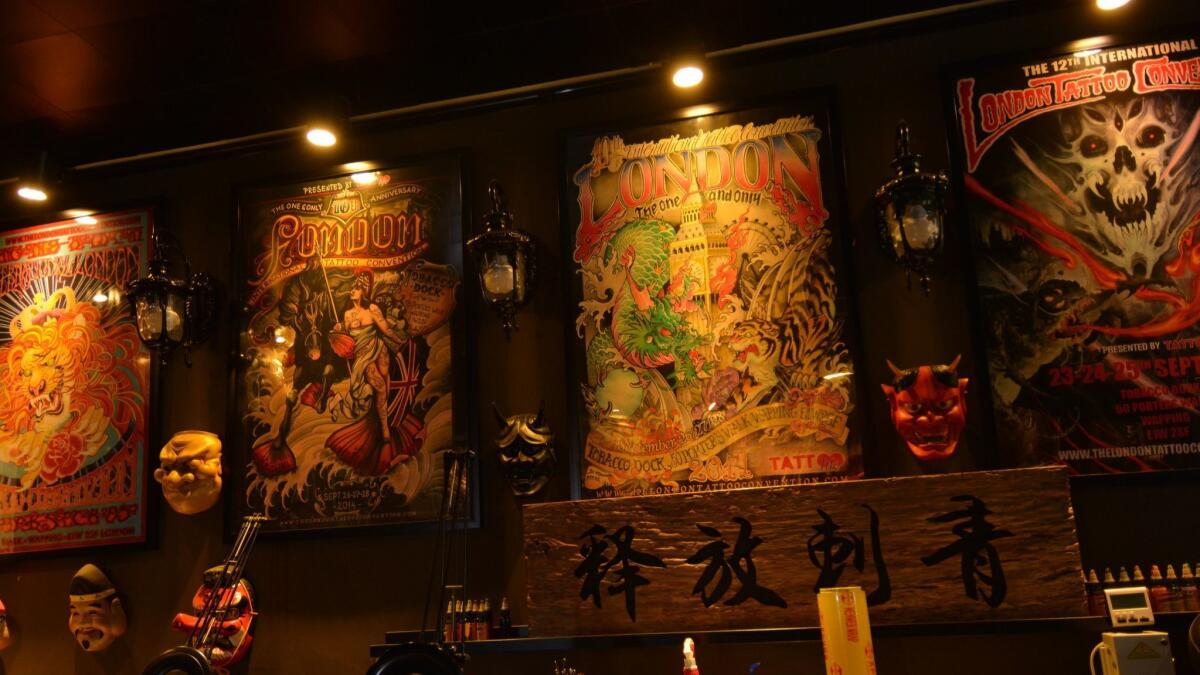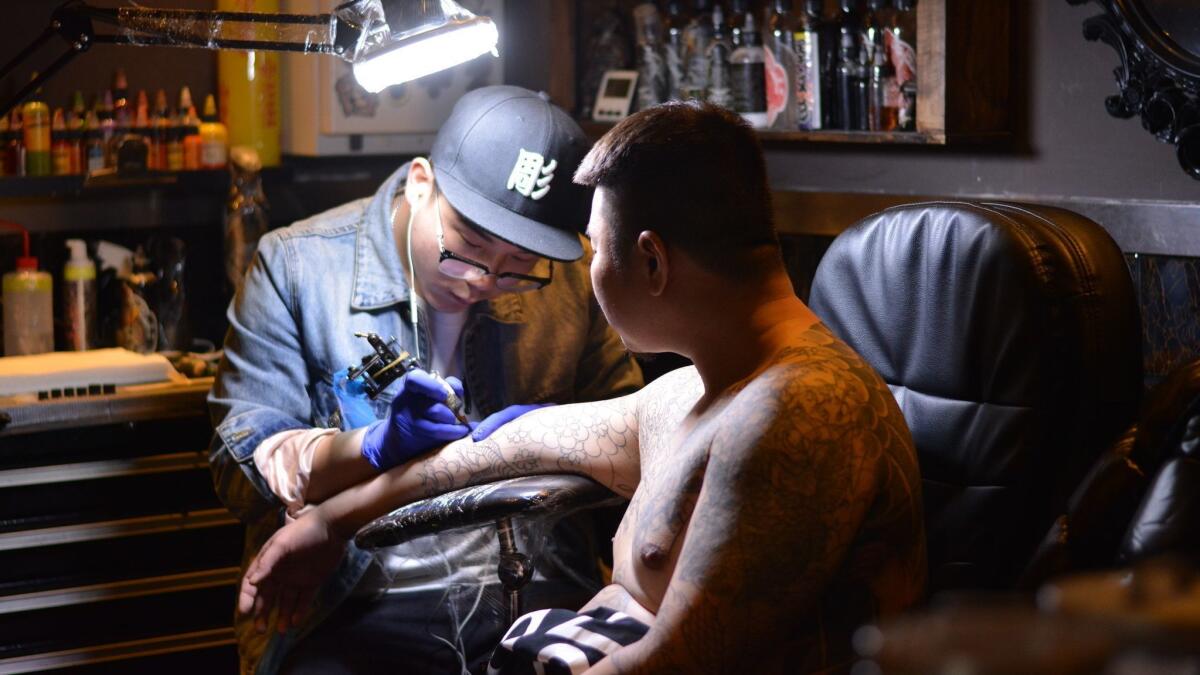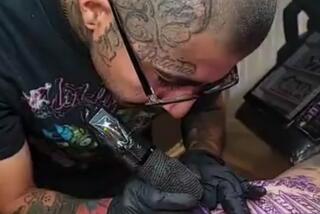In China, tattoos border on illegal — and they’re his life’s work

- Share via
Reporting from Beijing — Ma Chao has a strange request for his customers: Are you sure you want to do this?
Sometimes he tactfully sends them away, especially women.
To the horror of his parents, an auto factory worker and a retired street cleaner from Jilin province in northeastern China, Ma left school at the age of 14 to apprentice with a tattoo master.
Tattoos were long largely spurned in China, perceived as associated with gangsters, prisoners and crime. Even now, it is rare to see tattoos in the street or public life.
“My parents didn’t want me to become a tattooist because China is quite conservative and there’s a social stigma,” Ma said. “People associate it with criminality. My parents were worried it was bad people’s business. They were worried I might get involved in gangs.”
But, he insisted, it was like learning any other skill.
Ma, 26, who entered the trade around 2006, has gained fame within the subculture, earning as much as $12,500 a month, an amount unthinkable to his father, who nets $740 a month assembling automobile seats.
Tattoos began to gain a creeping popularity around the 2008 Beijing Olympics, with its influx of foreigners. The internet, meanwhile, has helped spread images of tattooed foreign celebrities.
Ma has won awards with his full body tattoos depicting swashbuckling outlaws and heroes from ancient Chinese literature, mythical creatures like dragons and phoenixes and auspicious symbols such as koi fish.

But he still believes sprawling ink of legendary bandits and warriors is not suitable for the female body.
“I only do it if it can be hidden. I carefully ask them to go away and think about it: Will it affect their family or will their employer react negatively?” He and his business partner, cousin Ma Quanquan, advise most clients to avoid inking parts of their body that cannot be hidden.
From the outside, the Shi Feng tattoo studio in west Beijing’s Xicheng district is an anonymous squat gray building without a sign or a light.
Inside, it feels like a dim man cave with its shiny black and gold tiles, matte black walls, glittering mirrors, gilt-framed posters, demonic grinning masks, a snarling model tiger head, a Chucky horror doll and soldier-straight rows of bottles of the vibrantly colored inks that characterize Chinese tattoo art.
Ma bends silently over his work, carefully dipping his needle into a small vial of ink and tattooing golden scales onto a koi fish outlined in brilliant green.
As the son of migrant workers, he was not eligible to go to a government high school in Beijing. He dropped out at 14 knowing his parents could not pay private school fees in the capital. While young, he was distracted in every class except art.
He exudes a quiet, shy aura, and rarely sweet-talks his clients.
He also continues to demonstrate unstinting respect and dedication to his tattoo “master,” who taught him the trade — and how to be a decent human being.
“I would serve tea and wine to my master whenever he needed it,” he said. “He taught me how to pour tea, how to pour wine for my elders.
“It was my master who taught me my social philosophy.”
He learned how to encourage his customers to endure the pain, especially for full body tattoos, which, at an hour a day, can take months to complete.
Tattoo studios have begun to quietly multiply in China, especially in major cities, and body ink has taken hold among rappers and livestreamers, giving it cachet among some young people.
Even so, China’s media watchdog last year banned celebrities with tattoos and other depictions of “subculture” from appearing on television. A Chinese TV network expunged Albania’s Eurovision entry because of singer Eugent Bushpepa’s tattoos. In January, when China’s national soccer team competed in the Asian Cup in Abu Dhabi, United Arab Emirates, some team players wore long sleeves to cover tattoos despite sweltering temperatures.
Even the armed services limit tattoos on arms and legs to about the size of a dime.
But that’s more than the Communist Party allowed when it came to power after World War II.
Back then, Mao Tse-tung’s minions outlawed tattoos.
That meant tattooists had to operate underground, and their clients were often criminals. Gabe Shum, a prominent Malaysian-born tattooist who runs the Hong Kong Tattoo Convention and owns Freedom Tattoo studios in Beijing and Hong Kong, says that even today, the industry falls into a gray area: not illegal, but not legally recognized either, and always under the shadow of Communist Party disapproval.
“There’s no license for a tattoo shop,” he said. “If the government wants to stop it, they can.
“The government could close it down tomorrow. It’s still a subculture.”
He says Chinese tattooists draw inspiration from the fine brush techniques of antique Chinese paintings, while Japanese artists mimic ukiyo-e woodblock prints of the 18th and 19th century.
In Japan, tattoos are also stigmatized: They are banned from hot springs, public baths, beaches and some gyms.
Middlebury College professor Carrie Wiebe, who teaches courses in premodern Chinese literature, has drawn on those ancient texts for an understanding of early Chinese tattoos. Criminals, slaves and concubines were tattooed, and some ethnic groups tattooed themselves to ward off evil. Such tattoos were stigmatized “as impure, deviant and uncivilized,” she writes in one of the few academic papers on the subject. Han Chinese viewed remote ethnic groups with tattooing cultures as “barbarians.”
Soldiers who tattooed themselves with oaths of loyalty did so to show courage and were depicted in premodern literature as heroic. Works from the 16th century depicted characters with decorative tattoos such as dragons.
Like most Chinese and Japanese tattooists, Ma draws his inspiration from China’s classical literary works, including the 16th century novel “The Water Margin,” about a 12th century gang of daredevil hero-bandits, five of them heavily tattooed with dragons or flowers.
The story reached Japan in the 17th century and became immensely popular. Chinese and Japanese tattoos often depict the exploits of these martial arts experts: hard-core drinkers with foul tempers, men who tame wild horses, leap over rivers, slaughter evildoers with cleavers or kill tigers with their bare hands. They have magical powers, terrifying scowls, wild eyes or heads like panthers.
Ma tattooed client Peter Liu’s entire back with a tattoo of one of the “Water Margin” gangsters, wild-eyed with a dagger in his teeth.
It took 80 hours to complete and it won first place in Shanghai’s tattoo convention.

Liu, who got his first tattoo at 15, recently returned to the studio to get more on his arms and chest. Quizzed about his love of tattoos and the inspiration behind his inking, he grew annoyed. Perhaps it was the pain.
“I just liked it. It looked good. It was cool,” he shrugged. But he snapped that his full back tattoo “has no deep meaning behind it. Why do you ask such stupid questions?”
Ma differs, saying that Chinese tattoos traditionally have layers of meaning for both the artist and the client, and are carefully discussed before the first needle pierces the flesh.
“Chinese tattoos have a lot of different cultural elements. Each one of them tells more than one story. It’s not like in the West: You like motorbikes, you get a tattoo of a motorbike,” Ma says.
“I take inspiration from ancient literature but add my own understanding. I love the process of brainstorming and coming up with original ideas.”
Ten percent of Ma’s customers are foreigners seeking Chinese-style tattoos.
In the U.S., about 40% of people ages 18 to 25 have at least one tattoo, according to Pew Research findings.
Ma has no tattoos, because his father forbade him. He also heeds his father’s advice to be cautious with customers who seem like shady types.
“I have experience with customers from Taiwan or Japan who used to have gangster backgrounds.”
Justin Liu, 33, visited the parlor recently to watch his girlfriend get inked. (She was determined to have a Chinese-style koi tattoo.) Liu, an assistant director in film and TV, got his first tattoo illegally in New Zealand when he was 16, and was a member of street gangs mainly in Taiwan from then until he was 21.
He has a massive swimming koi on his back, symbolizing wealth.
“You don’t get profiled as much here as back home [in Taiwan for having tattoos]. There, if you have traditional tattoos you’ll hardly get a job,” he said, referring to tattoos depicting Chinese elements or figures from literature. “When you have traditional tattoos like dragons and koi fish and demons, they’re stereotype gang tattoos. People get them because they want people to know they’re different and don’t mess with them.”
He said he took after his father, who was in gangs in the 1970s and ’80s and had the scars to show it.
Although he left gangs behind, he retains his passion for Chinese tattoos.
Ma wants to be so famous someday that tattoo artists around the world know his name and his work.
“It’s my passion. I never get tired of drawing.”
But will the Communist Party ever fall in love with the tattoo industry?
“I believe that one day it will be commonly accepted,” he said. “People will see a tattoo as a piece of art and a fashion statement. It will be normal, and people will no longer associate it with criminals and bad things.”
Twitter: @RobynDixon_LAT
More to Read
Sign up for Essential California
The most important California stories and recommendations in your inbox every morning.
You may occasionally receive promotional content from the Los Angeles Times.










